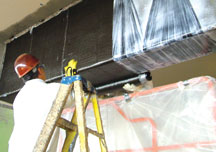
Polymer Reinforced Composites
Subcommittee D30.05 on Structural Test Methods is developing a series of standards addressing polymer reinforced composite materials used in the repair and reinforcement of concrete buildings and other civil structures. The latest approved standard in this series addresses the tension testing of materials that are externally bonded to concrete and other structural materials for repair, retrofit and strengthening purposes. D30.05 is part of ASTM International Committee D30 on Composite Materials.
The new standard, D7565/D7565M, Test Method for Determining Tensile Properties of Fiber Reinforced Polymer Matrix Composites Used for Strengthening of Civil Structures, provides tensile strength and modulus of elasticity, which are key parameters used to design a strengthening application. Russell Gentry, a D30 member and an associate professor at Georgia Institute of Technology, says that the new standard differs from the most well-known tension testing standard for composites - D3039, Test Method for Tensile Properties of Polymer Matrix Composite Materials - in that it provides specific instructions on fabricating specimens and calculating test results in a manner used in the construction industry as these materials are applied and cure in the field, and not in the controlled conditions typical of aerospace applications.
According to Gentry, material suppliers, contractors applying the materials and quality control laboratories will be the primary users of D7565/D7565M.
Other D30.05 civil infrastructure draft standards addressing material properties and durability of composite concrete reinforcement are currently under ballot. The drafts are:
- WK22346, Test Method for Determining Overlap Splice Tensile Properties of Fiber-Reinforced Polymer Matrix Composites Used for Strengthening of Civil Structures;
- WK22348, Test Method for Transverse Shear Strength of Fiber-Reinforced Polymer Matrix Composite Bars; and
- WK27200, Test Method for Alkali Resistance of Fiber-Reinforced Polymer (FRP) Matrix Composite Bars Used in Concrete Construction.
Gentry notes that much of this standards development work has been done in conjunction with American Concrete Institute Committee 440 on Fiber Reinforced Polymer Reinforcement.
"We are in our fifth year of an ASTM-ACI collaboration that has produced five test methods so far," says Gentry, who also notes that greater participation in D30.05 activities is encouraged. "Many of these proposed test methods would benefit from additional review from the civil engineering structures community and from round robin testing to establish precision and bias."To purchase ASTM International standards, visit www.astm.org and search by the standard designation number or contact ASTM Customer Relations (phone: 610-832-9585).
NTACT Technical Information: Russell Gentry, Georgia Institute of Technology • Decatur, Ga. • 404-489-3845 • E-mail: russell.gentry@arch.gatech.edu O ASTM Staff: Jennifer Rodgers • Phone: 610-832-9694 • E-mail: jrodgers@astm.org O Upcoming Meeting: Sept. 22-23 • Dayton, Ohio • In conjunction with the American Society for Composites
 SN Home
SN Home Archive
Archive Advertisers
Advertisers Masthead
Masthead RateCard
RateCard Subscribe
Subscribe Email Editor
Email Editor